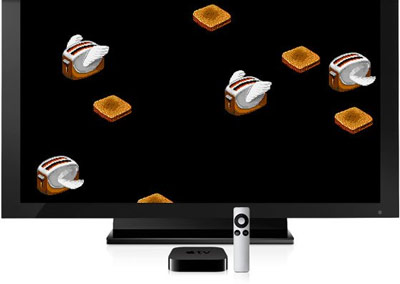If You’re Expecting The TV Industry To Just ‘Collapse’, Keep Dreaming
 The Internet has already changed the television industry significantly, and will continue to do so. But the idea that the web will cause the TV business to “collapse” is fantasy.
The Internet has already changed the television industry significantly, and will continue to do so. But the idea that the web will cause the TV business to “collapse” is fantasy.
Henry Blodget has just written a wildly popular post called “Don’t Mean To Be Alarmist, But The TV Business May Be Starting To Collapse.” Henry’s post argues that changing TV viewer behavior, catalyzed by things like the Internet, Netflix, Hulu, iPad, etc., could cause the TV industry to rapidly collapse, the way the newspaper industry did. Given the high fives it’s getting on Twitter, a lot of the tech world is clearly hoping it’s true.
Actually, it’s very similar to a post Henry — my long-time former boss! — wrote three years ago, called “Sorry, There’s No Way To Save The TV Business.”
In that post, Henry also laid out a significantly overhauled vision for the TV industry — things like “The cable companies will become dumb pipes, and they’ll get disintermediated.” — and predicted it would start happening “Over the next 5-10 years. And it will leave today’s TV industry looking like today’s newspaper industry.” Well… those 5 years are now 60% over, and those 10 years are now 30% over. But not much has changed since then.
The reality is that, yes, the TV industry will change over time. Some of today’s winners will become tomorrow’s losers, and new entrants may grow to dominate. But barring some unforeseen technical or creative revolution, it’s going to happen a lot slower than you think.
It is easy to complain that the cable/telco/satellite-dominated TV distribution system is inefficient, too expensive, or “ripe for disruption”, and many do. But that model is actually still very strong.
- Disney, owner of networks like ABC, ESPN, and others, recently signed another 10-year contract with Comcast, the largest U.S. cable company. Not only does that keep the price up for ABC’s cable channels, but it also maintains the network “bundling” that the TV industry loves but consumers love to complain about: If you want ESPN, you also have to pay for ABC Family. This will make it harder for any unbundled, à la carte, web-based “cable” competitor to exist. (Related: MG Siegler has previously argued that “ESPN that has to be the true pioneer” in building new business models, because they’re “the one content provider that has the cable companies by the balls.” But actually, ESPN and parent Disney have among the most to lose by seeing today’s cable model dissolve, so expect them to continue to be among the most loyal to cable providers until it’s a much better time to flip.)
- More TV content is heading to the web, even live sports. But more of that web TV content will require you to log in with your cable credentials. For instance: Hulu has moved Fox shows behind an “authentication” wall: You can sign in with a Dish Network or Verizon ID to get Fox shows the day after they air on TV, or you can wait 8 days. NBC, now owned by Comcast, will live-stream the entire Olympics this year, but you need to be a cable or satellite TV subscriber to watch. Don’t expect HBO to give up its cable subscriber model for HBO GO anytime soon, either. (Microsoft has given into the cable authentication model for the Xbox. Apple has not yet for the Apple TV. It’s going to be interesting to see if apps for forthcoming Apple television products permit it, or if Apple’s going to try to use its popularity to strong-arm the networks away from it.)
Also, a friendly reminder: The idea that whatever’s next is going to be significantly cheaper is wishful thinking.
A lot of the complaining about today’s TV business — the bundles, the nickel-and-diming, the DVR fees, whatever — is about its price. (Amusingly, largely by wealthy white men!) But I haven’t seen a real analysis that would lead to dramatically lower pricing for the same amount of TV consumption.
Sure, you can stop paying $100 for cable and watch only Netflix and Hulu videos for $8 a month. But that doesn’t count. (Btw, I did that for a while. It was fine when I needed to save money. But I’m back to cable.) If 100 million households eventually shift to watching TV à la carte via web connections, the cost of content and bandwidth could easily increase substantially, or at least stay the same.
Maybe you’ll be spending that $150 per month on Internet access and various video services instead of cable TV, but it’s not like your all-in living room bill is going to be $45 in a few years. Especially if you’re trying to remove advertising from the equation! And as the cable providers continue to build more value into their subscriptions — iPad live-streaming apps, access to more web streams ahead of non-subscribers, bigger on-demand libraries, and more free movies, they continue to look like a better deal.
Now: I’m not stupid enough to think that this business model will thrive or last forever. And as a TV user, it would be pretty great to see a company like Apple do something bold to mess with the TV industry’s power structure. I love what comedians like Louis CK are doing to skirt the old-world distribution networks and do things in-house, but those are still rare outliers. And the rise of YouTube and Vimeo may help change the definition of a TV show to something that’s shorter and less expensive to make, gradually reducing the power of today’s TV networks.
But the idea that what we have today is just going to “collapse” is pretty silly.

Check out my new site: The New Consumer, a publication about how and why people spend their time and money.

